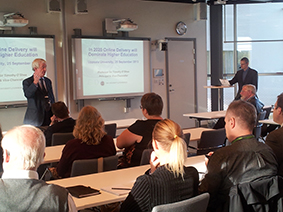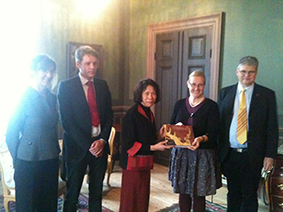Last week, we received a visit from the principal of Edinburgh University, Professor Sir Timothy O’Shea. He gave a talk entitled “In 2020 Online Delivery will Dominate Higher Education”. The following discussions about MOOCs and the future of education were very lively. Those of you who read the blog regularly know that the Vice-Chancellor’s Management Council visited Edinburgh University last spring. Our universities have a lot in common and we intend to both broaden and deepen our cooperation.
We have also met our counterpart at SLU (the Swedish University of Agricultural Sciences). We do this on a regular basis to review our existing partnerships, but also to see in which new areas we can expand our collaboration. Uppsala University and SLU received a large donation from the Beijer Foundation last week. The donation was at just over SEK 30 million, spread over five years, and we are very grateful for this generous contribution.
Another interesting visit was from representatives of TICA. TICA (Thailand International Development Cooperation Agency) corresponds to SIDA (Swedish International Development Cooperation Agency) in Sweden and finances the Thailand Research Fund whose Royal Golden Jubilee PhD Programme manages thousands of Thai students that are studying abroad, for example at the University of Uppsala.
Last week I received an email from the Department of History, who had received a visit from a former exchange student , Craig Kelly, and his father Graeme Kelly. They are doing something they call the “Journey for Jane”, a journey to honour their sister/daughter who died under tragic circumstances in the autumn of 2011. The purpose of the trip is to support an organization that uses art and artistic activities as rehabilitation for families who have experienced the same type of traumatic events that the family goes through. The history department has made a private collection for the purpose, and will also start a blog. Learn more about a Jouney for Jane and their project here.
Recently we have been reading in our local newspaper UNT about some farmers’ discontent with the management of our land donations and Akademiförvaltningen. In the interview I promised to bring the matter to the board, which I did this week . First I want to say that the board takes the criticism very seriously – even if everything has been conducted under proper circumstances and there is no question of any violations of the regulations. That there is criticism and dissatisfaction is reason enough for the board to review these cases thoroughly . This was made at the meeting. We did a thorough review of the work of Akademiförvaltningen, and have come up with constructive solutions. Also, the strategy of our agricultural management was discussed.
It was interesting and illuminating to hear about the University’s agricultural management from the 1950’s and onwards. The land area has increased only marginally within Uppsala county, but the area is more coherent. It is a picture of the rationalization that has occurred generally in agriculture in Sweden with fewer but larger farms. The focus is more on crop production, which requires more land in order for the farmers to be able to support themselves. The total agricultural area is basically the same today as it was in the 1950’s (14,900 hectares in 1954, compared to 14,299 hectares in 2013). Within Uppsala county we hold 7,786 hectares today, compared to 6,454 hectares in 1954.
Uppsala University has a responsibility towards our donors. As Vice-Chancellor of Uppsala University, I am anxious that funds are managed as well as possible according to donor’s wishes. The mission of Akademiförvaltningen is to do just that, within the context of all applicable regulations. This is also a way to spread the risks between finance, real estate, agriculture and forestry. The board will continue to follow up and keep us informed about these issues going forward.


